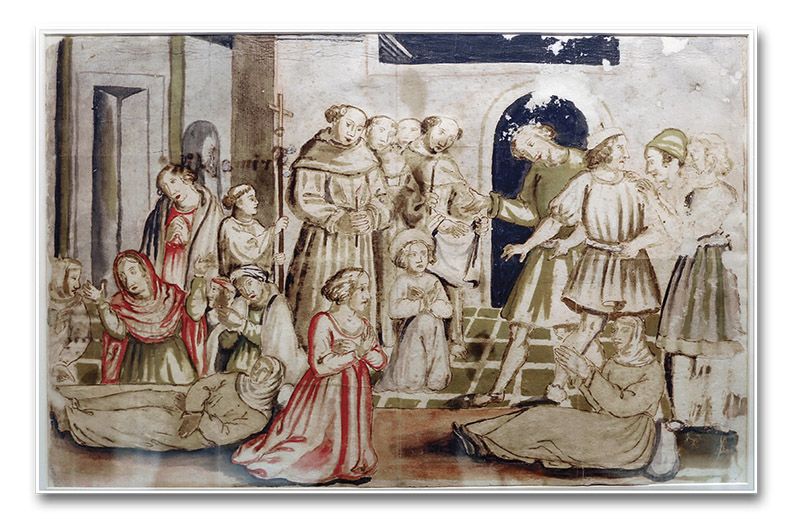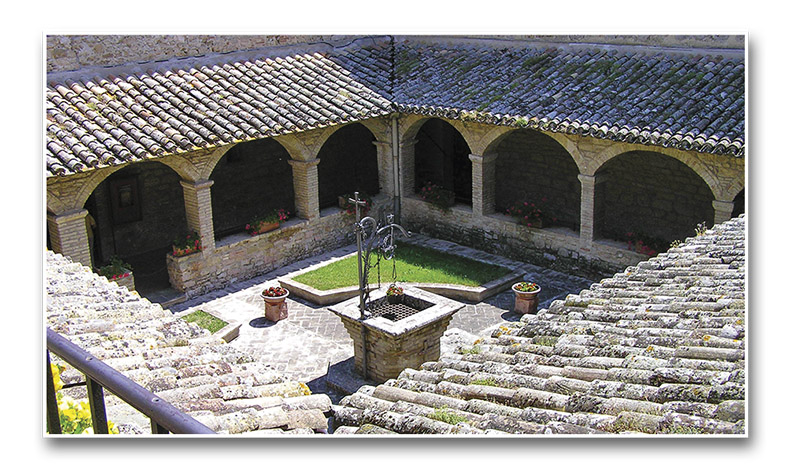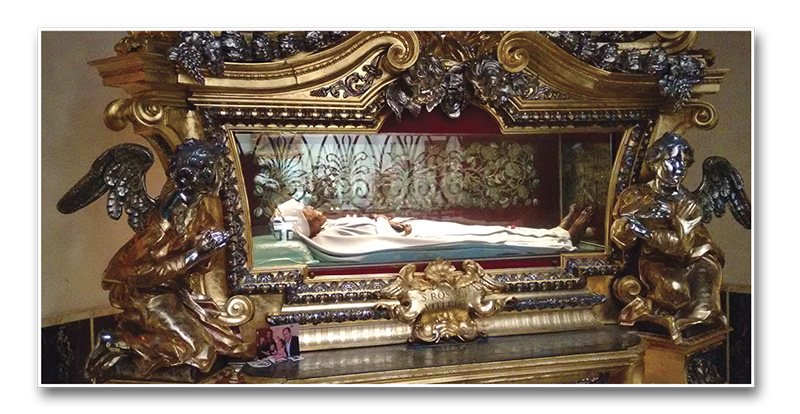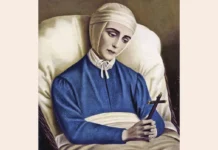From her earliest childhood, the seraphic soul of Rose received a lofty mission, of profound, far-reaching and exceptional import: to suffer the martyrdom of fidelity, while fighting the wave of greed and rebellion that seemed to engulf Europe.
“Love is patient and kind; love is not jealous or boastful; it is not arrogant or rude. Love does not insist on its own way; it is not irritable or resentful; it does not rejoice at wrong, but rejoices in the right. Love bears all things, believes all things, hopes all things, endures all things” (1 Cor 13:4-7).
This passage of Sacred Scripture aptly summarizes the life of Rose of Viterbo. A simple Italian peasant, she endured persecution, suffering and adversity, and proclaimed to future ages that nothing is impossible for a soul who truly loves Our Lord Jesus Christ.
Born in the thick of war
The city of Rose’s birth had become the setting for a violent dispute in the thirteenth century. The Holy Church, besides being assailed by the Cathar heresy, was at that time being persecuted and defied by Frederick II, the German Emperor who aimed to annex Italy to his domains, and to achieve this, did not hesitate to appropriate even the pontifical lands, of which Viterbo was also a part.
The Italian peninsula became divided into two parties: the followers of the emperor, called Ghibellines, and the defenders of the Holy Father, known as Guelfs. The latter had a numerous and strong presence in Viterbo, which led Pope Gregory IX, expelled from Rome by the rebels, to take refuge in the Pontifical Palace located there. Thus, St. Rose, born in 1235, was closely acquainted with the chaos of her time and the fury of the enemies against the Church.
In 1240, Viterbo fell into the hands of officials of the Emperor, who tyrannized the population. The people and the Guelf nobles were forced to work in the building of a fortress, transporting stones and wood in an exhausting routine.

Furthermore, the impious sovereign ordered the imprisonment of all those suspected of taking up arms against him in support of the Pope. Their foreheads were branded by their torturers with incandescent irons and they were confined in contaminated dungeons along with cadavers, or at times burned alive. The inhabitants of Viterbo were threatened with death at every moment, whether due to misery, hunger or incarceration in the terrible dungeons they themselves had to build…
Such was the historic context in which little Rose grew up. Thus, from her earliest childhood, she understood the holiness of the Church and the depravity of her persecutors. In face of this twofold scenario, two extremes coexisted harmoniously in her young soul: a strong love for good, and an intense hatred of evil.
Childhood abounding in miracles
From a tender age, Rose showed authentic signs of virtue and the odour of her sanctity attracted the attention of her relatives and those close to her. Even before learning to walk, she eagerly accompanied her mother to Masses and other acts of piety in St. Mary in Poggio Parish, demonstrating extraordinary recollection.
She rejoiced upon hearing episodes from the life of St. Clare, who had lived a cloistered life in Assisi since 1212 with other young women who followed her radical path of consecration to Christ. She was especially enchanted with the narration of the miraculous defeat inflicted by this holy foundress on the Saracens who tried to take possession of her convent!
It is said that one day the little girl was observed unawares in her room, surrounded by little birds that happily flew around her, allowing her to hold and stroke them, undoubtedly drawn by her great innocence…
Her biographers also narrate that when Rose was only three years old, a sister of her father died. Upon receiving the news, the holy girl approached the coffin, knelt, and raised her hands in prayer to Our Lord Jesus Christ. Then, imposing her small hands on the cadaver and gently calling out to her aunt, she miraculously restored her life, to the amazement of all those present.1
First contacts with society
Following the example of the Divine Infant, Rose grew each day in wisdom and grace, before God and men (cf. Lk 2:52). Thus, in contact with those around her, Rose analysed the conversations she heard with deep insight.
The general anxiety that reigned led this little seraph to meditate at length on how to show her love to Our Lord Jesus Christ, expiate for the sins committed against Him, and to combat those who insulted the Church. Not finding, at first, the means to do this, she began to help the sick she met, and to give them food.
Regarding this zealous apostolate, another biographer comments: “It was said that God always heeded her supplications. Some of the sick were certain that it was she who had cured them. ‘I owe her my life!’ her aunt would say. Her mother, in turn, declared: ‘Without her prayers I would not have had this other child, nor would I even be alive.’ And a companion of the Saint related: ‘Moved by my tears and my fear of being admonished, Rose put my jug back together, after it broke when it came out of the well.’ Thus, a golden legend gradually developed around Rose, on account of the people who turned to her intercession and benefitted from her unfailing goodness.”2
All of these prodigies could only arise from a life of deep piety, and Rose did not lack this. In her room, “a cramped space illuminated by a small grated opening at the top of a thick wall, similar to that found in a prison,”3 she spent long hours in prayer, kneeling on the uneven floor, absorbed in contemplation. There, she practised harsh and austere penances, and there she received innumerable mystical communications and supernatural visions, which were already commonplace for her. Many spied on her, so as to be edified at the sight of her fervour!
Rose felt called to monastic life. However, as later happened with St. Thérèse of the Child Jesus, she was prevented from entering a convent due to her young age… Nevertheless, undeterred, she strove to model her life at home as closely as possible to religious life.

The Blessed Virgin Mary entrusts her with a mission
At eight years of age, Rose fell gravely ill. A fever kept her bedridden for fifteen painful months. As a result of her illness, she was reduced to “a poor pallid girl, lying in a corner of her room, on a straw mattress.”4
Nevertheless, “she never complained, and when she was afflicted by a coughing fit, she gently whispered: ‘Thank you, my Lord!’”5 Like a little lamb, she allowed herself to be immolated by the wise hands of God and rejoiced in consoling Jesus with her sufferings. But in her generosity, she believed her sufferings insufficient and, hindered from practising greater penances, she implored the Divine Redeemer insistently: “My sweet Lord, make me suffer for Thee, otherwise call me to Thy side!”6
God did in fact call her, not to Heaven, but to fight the apostate emperor who, like the ancient Roman Caesars, sought to make himself the ruler of the whole world.
One day, in the presence of some neighbours and acquaintances, with her eyes closed and barely conscious as a result of her sickness, a slight smile suddenly appeared on the angelic child’s face… Her eyes opened wide, shining, and she stood up. She was in an ecstasy!
After conversing with some heavenly visitors, she ordered the onlookers: “Kneel down! Greet the Queen who arrives, surrounded by Angels and Saints!”7 Then, like someone repeating, word for word, a text dictated by another, she began to repeat what the Blessed Virgin said to her: “My daughter, you shall wear the habit of penance and preach against the enemies of the Faith! Do not be afraid! All those who listen to you will be blessed in this life and in the next, and those who turn a deaf ear to you will be chastised!”8
Thus, Our Lady confirmed all the desires that grace had sown in her soul from the earliest age, and entrusted to her a lofty mission, of profound, far-reaching and exceptional import: to suffer the martyrdom of fidelity, with firm and categorical resolution, combatting the wave of greed and rebellion that seemed to engulf Europe.
Her preaching begins
After the miracle, the young Saint immediately began to carry out the celestial commands: she cut her hair, donned a poor and rough penitential tunic, and set out on pilgrimage to St. John the Baptist Church, for it was June 24, the commemoration of his birth. Numerous faithful followed behind her; having heard of her miraculous cure and the apparition of Our Lady, they wanted to contemplate her holiness first-hand.
From then on, Rose dedicated herself exclusively to preaching: she went through the streets of the city, always with a crucifix in her hands, speaking to the crowds and enkindling in them the love of the Crucified and repentance for their sins. Her zeal for the cause of the Church, her passion for the Divine Redeemer and her desire to bring an end to the offences against Him gave her a holy obstinacy for the conversion of souls, so that she preached both in season and out of season, without concern for herself, with an inexhaustible patience and admirable wisdom.
Often, the numbers gathering to hear her exhortations were so great, and the girl so small of stature, that she had to climb up on rocks to be seen by all… The contact with her soul of light encouraged the weak, brought back the wayward and sanctified the good.
Incompatible with error
Gifted with intrepidness, and unwavering in face of evil, St. Rose often engaged in heated arguments with certain Ghibellines who dared to utter injurious words against the Pope and the Church. One day, one of them insulted and brutally struck her. Far from becoming angry, she calmly said: “Unfortunate soul… Within three days you will be struck!” In fact, three days later, the unbeliever was found with leprosy and became the object of horror to all his countrymen.9
This presence of this virtuous girl in Viterbo was a source of exasperation for the enemies of the Faith, for she converted a great many of their followers, constantly foiled their plans and enkindled enthusiasm in the army of the Papal defenders. Impetuous, audacious and fearless, Rose refuted outrageous affronts and rebuked the faithless. Despite her youth and frailty, she became the scourge of the Cathars and the ruin of the Ghibellines, through her crystalline fidelity.
But the hatred of the wicked against Rose reached its peak when she began to prophesy the approaching death of Frederick II: “Listen carefully! Within a few days you will exalt with joy, for you will obtain a great victory! This night, an Angel has announced to me the proximate death of the emperor!”10 Enraged, the Ghibellines leaders and governors decided to exile her, since killing her would provoke an uncontrollable rebellion.
Having no other recourse, the seraphic virgin, accompanied by her parents, John and Catherine, was forced to leave her village at night, in the middle of a harsh European winter, with no destination. They took refuge in the citadel of Soriano, where the Guelfs held power.
Some time later, the death of Frederick II, which occurred on December 13, 1250, was publicly announced. Thus, after eighteen months of exile, Rose could return to her native land, where she finally saw the immediate fruits of her apostolate and efforts: Pope Innocent IV recovered the pontifical cities, one by one, and proceeded to Viterbo where he ordered the demolition of the Ghibelline fortress and the subjugation of the rebels.

Final years lived in recollection
Having fulfilled the task entrusted to her by the Blessed Virgin, and desiring to withdraw into seclusion, Rose asked to be received into the Clarist monastery of San Damiano, but the superior rejected her under various pretexts. The truth was that she considered the Saint “a dangerous visionary, likely to disturb the peace of the community with her folly.”11
The holy girl did not insist, but announced: “You will not receive me now, but the day will come when you will be very glad to accept me!”12 And she resigned herself to spending the rest of her days in recollection in her home.
Before long, some young friends joined her, and, instructed by her wise teachings, they also dedicated their lives to the service of God. In this way, Rose brought together a sizeable number of followers and founded a prosperous community of women guided by the rule of the Third Order of St. Francis. However, the nuns of San Damiano soon obtained a bull from Pope Innocent IV prohibiting the establishment of any religious community within two miles of their convent. The disciples of St. Rose were obliged to disperse.13
Those who should have supported her despised her as an insane woman and sought to drive her away; however, without the least resentment or complaint, she consoled herself by recalling that such rejections and moral sufferings were also endured, in a pre-eminent degree, by her beloved Jesus.
Serene entry into eternity
After spending several months secluded in her home, the little Angel of Viterbo succumbed to the illness by means of which God would call her to Heaven. Always of fragile health, Rose rapidly approached her agony. She confessed, received Viaticum with admirable piety and serenely expired, pronouncing the sacred names of Jesus and Mary.
The people of Viterbo wept copiously and immediately began to have recourse to her intercession, as a Saint. The Blessed in Heaven, on their part, joyfully received her who, on this earth, did nothing but proclaim by her works the stirring words of the psalmist: “For what have I in Heaven? and besides Thee what do I desire upon earth? For Thee my flesh and my heart hath fainted away: Thou art the God of my heart, and the God that is my portion for ever. For behold they that go far from Thee shall perish: Thou hast destroyed all them that are disloyal to Thee. But it is good for me to adhere to my God, to put my hope in the Lord God: That I may declare all Thy praises, in the gates of the daughter of Sion” (cf. Ps 72:25-28).
Eighteen months after Rose’s death, her body, which had been buried in the parish cemetery of St. Mary in Poggio, was exhumed and found incorrupt. Seven years later, on September 4, 1258, Pope Alexandre IV had her transferred with great ceremony to the Convent of San Damiano, the same that had previously rejected her. ◊







